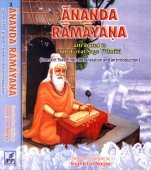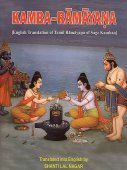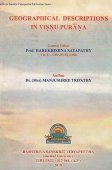Sarga, Sharga: 19 definitions
Introduction:
Sarga means something in Hinduism, Sanskrit, Jainism, Prakrit, Marathi, Hindi, biology. If you want to know the exact meaning, history, etymology or English translation of this term then check out the descriptions on this page. Add your comment or reference to a book if you want to contribute to this summary article.
Alternative spellings of this word include Sarg.
In Hinduism
Shilpashastra (iconography)
Source: Wisdom Library: Elements of Hindu IconograpySarga (सर्ग):—Son of Paśupati (aspect of Śiva, as in, one of the eight names of Rudra) and Suvarchalā, according to the Pādma-purāṇa.
The Viṣṇu-purāṇa places the name Skanda is this position.

Shilpashastra (शिल्पशास्त्र, śilpaśāstra) represents the ancient Indian science (shastra) of creative arts (shilpa) such as sculpture, iconography and painting. Closely related to Vastushastra (architecture), they often share the same literature.
Purana and Itihasa (epic history)
Source: archive.org: Puranic EncyclopediaSarga (सर्ग).—(creation) Agni Purāṇa, Chapter 20 refers to various sargas as follows.
The first creation is that of greatness (Mahatva) i e. Brahmā. The second creation is that of tanmātras called bhūtasarga. The third is Vaikārikasarga also called Aindriyikasarga. These three kinds of creation are called Prākṛta sṛṣṭi (natural creation) and that is conscious and intelligent creation. The fourth is mukhyasarga. Mukhyas mean immovables. The fifth is tiryagyonisṛṣṭi. Since it functions side-long it is called tiryaksrotas. The sixth is the creation of Ūrdhvasrotas, called devasarga. The seventh is the creation of arvāksrotas, called mānuṣasarga. The eighth, anugrahasarga, is both sāttvic and tāmasic. Thus, vaikṛtasargas are five in number and prākṛtasargas three. The ninth sarga is the Kaumāra sarga, which is both vaikṛta and Prākṛta. The fundamental or root cause of the universe is the above nine creations of Brahmā. Prākṛtasarga is of three types, nitya (eternal), naimittika (casual) and dainandina (daily). Nityasarga is the creation after interim deluges.
Source: archive.org: Shiva Purana - English TranslationSarga (सर्ग, “creation”) refers to the “creation of the world” and represents one of the “five-fold duties” (pañcakṛtya), according to Śivapurāna 1.10.1-5, “[...] the permanent cycle of the five-fold duties consists of creation, maintenance, annihilation, concealment, and blessing. [...] Sarga is the creation of the world. [...] These five are my activities but are carried on by others silently as in the case of the statue at the Portal. The first four activities concern the evolution of the world and the fifth one is the cause of salvation. All these constitute my prerogatives. These activities are observed in the five elements by devotees—Sarga (creation) in the Earth [...] Everything is created by the Earth; [...] In order to look after these five-fold activities (pañcakṛtya) I have five faces, four in the four quarters and the fifth in the middle”.
(As mentioned in Śivapurāṇa 2.1.15): the Paurāṇic cosmology divides the cosmic creation into nine classes: viz
- “mukhyasarga”, creation of insentient objects
- “tiryaksarga”, creation of animals
- “devasarga”, creation of divine beings
- “rājasasarga”, creation of human beings
- “bhūtādisarga” creation of elements
- “mahatsarga”, creation of intellect
- “sūkṣmabhūtasarga” creation of subtle elements
- “vaikārikasarga” secondary creation
- “kaumārasarga” primary and secondary creation.
1a) Sarga (सर्ग).—One of the five sections of the Purāṇa;1 dealing with creation of the universe;2 different kinds of;3 Prākṛta;4 of Brahmā.5
- 1) Matsya-purāṇa 53. 65; Vāyu-purāṇa 4. 10; 9. 4; 100. 195. 53; 132; 103. 9.
- 2) Brahmāṇḍa-purāṇa IV. 1. 37; 3 and 26. 31. 4. 5.
- 3) Ib. I. 153-54; II. 5. 55-8. Vāyu-purāṇa 1. 63.
- 4) Ib. 4. 90; Viṣṇu-purāṇa 1. 5. 19-20, 24.
- 5) Vāyu-purāṇa 8. 36-40.
1b) The order of creation; a form of Brahman known as Puruṣa and Kṣetrajña with the aid of Pradhāna originated mahat tatva out of which was born ahamkāra; engaged further in creation, the creator engendered the rudiment of sound (śabdatanmātṛkam) from which was produced, ākāśa or ether; it was invested with śabda or sound; then was created Vāyu, invested with the rudiment of touch, fire invested with the rudiment of rūpa or form, waters invested with the rudiment of taste; and lastly an aggregate of all this (earth) originates, of which smell is the property; those rudimental elements are designated aviśeṣas or devoid of qualities and this goes by the name of elemental creation; from ahamkāra are again produced the ten organs of sense and the ten divinities along with the eleventh, mind. These several elements could not by themselves produce and therefore there was a blending; and the result of this compound was the formation of an egg-like aṇḍa, where figures the Lord in vyakta rūpa; its womb being Meru and its water being the oceans containing all worlds, Gods and men, surrounded outside by seven envelopes like elements of fire, water etc.; first was one of darkness of five Parvas: darkness, illusion, blindness, ignorance, and of no light; three prākṛta sargas—mahata, bhūta, and aindriyaka; three Vaikṛta sargas—mukhya sarga, tairyakyoni, deva sarga arvāksrotasa and anugraha sarga; the ninth sarga was named kaumāra; then came the creation of devās, asuras, pitṛs and men.*
- * Viṣṇu-purāṇa I. 2-7, 29-60: 5. 4-5, 19-25; VI. 8. 2 and 13.
1c) A son of Ākāśa.*
- * Viṣṇu-purāṇa I. 8. 11.
1d) (Vaikṛtas): created as distinct from Prākṛta; five in number; these are mukhya sarga (sthāvara), tairyakyoni (tiryaksrotas), deva sarga ūrdhvasrotas), mānuṣa (arvāksrotasa) and anugraha (blend of sātvīka and tāmasa).*
- * Viṣṇu-purāṇa I. 5. 21-24.
Sarga (सर्ग) refers to “creation or evolution of the Universe” and represents one of the various aspects of the Pañcalakṣaṇa definition of Purāṇas, according to Amarakoṣa: the famous Sanskrit lexicon of the 5th Century A.D.—Accordingly, the Purāṇas are supposed to contain theories about [viz., sarga (creation or evolution of the Universe)].—The ‘sarga’ chapter of the Saurapurāṇa does not conform to the ‘sarga’ which has been taken up as the earliest account in the Purāṇas Pañcalakṣaṇa of Kirfel. However the sarga section of the Saurapurāṇa closely follows the Kūrmapurāṇa.

The Purana (पुराण, purāṇas) refers to Sanskrit literature preserving ancient India’s vast cultural history, including historical legends, religious ceremonies, various arts and sciences. The eighteen mahapuranas total over 400,000 shlokas (metrical couplets) and date to at least several centuries BCE.
Samkhya (school of philosophy)
Source: Shodhganga: Prakrti and purusa in Samkhyakarika an analytical reviewSarga (सर्ग, “products”).—A series of sargas (products) come into being during tattvapariṇāma (elemental manifestations). Such sargas are of two categories: (i) pratyayasarga (intellectual products), and (ii) tanmātrasarga (physical products).
Pratyayasarga is divided into four categories, viz.,
- viparyaya (ignorance),
- aśakti (incapacity),
- tuṣṭi (complacence),
- siddhi (attainment).
Tanmātrasarga is divided into three basic categories, viz.
- daiva-yoni (divine family or celestial order),
- mānuṣya-yoni (human family or human order),
- tairyak-yoni (sub-human family or sub-human order).

Samkhya (सांख्य, Sāṃkhya) is a dualistic school of Hindu philosophy (astika) and is closeley related to the Yoga school. Samkhya philosophy accepts three pramanas (‘proofs’) only as valid means of gaining knowledge. Another important concept is their theory of evolution, revolving around prakriti (matter) and purusha (consciousness).
In Jainism
General definition (in Jainism)
Source: The University of Sydney: A study of the Twelve ReflectionsSarga (सर्ग) refers to a “child”, according to the 11th century Jñānārṇava, a treatise on Jain Yoga in roughly 2200 Sanskrit verses composed by Śubhacandra.—Accordingly, “Certainly, O friend, these twelve reflections are the female friends (var.—sarga—‘a child’) of those whose good fortune is liberation [and] they are practised to procure their friendship by wise men who are absorbed in connection [with them]. When these [reflections] are correctly done constantly for the pleasure of the lords of Yogīs (i.e. the Jinas), a joyful woman in the form of liberation with a heart kindly disposed to love, is produced”.

Jainism is an Indian religion of Dharma whose doctrine revolves around harmlessness (ahimsa) towards every living being. The two major branches (Digambara and Svetambara) of Jainism stimulate self-control (or, shramana, ‘self-reliance’) and spiritual development through a path of peace for the soul to progess to the ultimate goal.
Biology (plants and animals)
Source: Google Books: CRC World Dictionary (Regional names)Sarga in Nigeria is the name of a plant defined with Eleusine coracana in various botanical sources. This page contains potential references in Ayurveda, modern medicine, and other folk traditions or local practices It has the synonym Cynosurus coracanus L. (among others).
Example references for further research on medicinal uses or toxicity (see latin names for full list):
· Journal of Ethnopharmacology (2003)
· Atti dell’Istituto Botanico dell’Università di Pavia (1944)
· Species Plantarum (1762)
· Grasses of Ceylon (1956)
· Hortus Britannicus (1830)
· Apontamentos Phytogeographicos (1859)
If you are looking for specific details regarding Sarga, for example extract dosage, health benefits, chemical composition, diet and recipes, side effects, pregnancy safety, have a look at these references.

This sections includes definitions from the five kingdoms of living things: Animals, Plants, Fungi, Protists and Monera. It will include both the official binomial nomenclature (scientific names usually in Latin) as well as regional spellings and variants.
Languages of India and abroad
Marathi-English dictionary
Source: DDSA: The Molesworth Marathi and English Dictionarysarga (सर्ग).—m S A canto, a book, a section of a poem &c. 2 Creation.
Marathi is an Indo-European language having over 70 million native speakers people in (predominantly) Maharashtra India. Marathi, like many other Indo-Aryan languages, evolved from early forms of Prakrit, which itself is a subset of Sanskrit, one of the most ancient languages of the world.
Sanskrit dictionary
Source: DDSA: The practical Sanskrit-English dictionarySarga (सर्ग).—[sṛj-ghañ]
1) Relinquishment, abandonment.
2) Creation; आराध्य विप्रान् स्मरमादिसर्गे (ārādhya viprān smaramādisarge) Bhāgavata 3.1.28; अस्याः सर्गविधौ प्रजापतिरभूच्चन्द्रो नु कान्तिप्रदः (asyāḥ sargavidhau prajāpatirabhūccandro nu kāntipradaḥ) V.1.8.
3) The creation of the world; प्रलयस्थितिसर्गाणां कारणतां गतः (pralayasthitisargāṇāṃ kāraṇatāṃ gataḥ) Kumārasambhava 2.6; R. 3.27; सर्गो नवविधस्तस्य प्राकृतो वैकृतस्तु यः (sargo navavidhastasya prākṛto vaikṛtastu yaḥ) Bhāgavata 3.1.13.
4) Nature, the universe; इहैव तैर्जितः सर्गो येषां साभ्ये स्थितं मनः (ihaiva tairjitaḥ sargo yeṣāṃ sābhye sthitaṃ manaḥ) Bhagavadgītā (Bombay) 5.19.
5) Natural property, nature.
6) Determination, resolve; गृहाण शस्त्रं यदि सर्ग एष ते (gṛhāṇa śastraṃ yadi sarga eṣa te) R.3.51;14. 42; Śiśupālavadha 19.38.
7) Assent, agreement.
8) A section, chapter, canto (as of a poem).
9) Rush, onset, advance (of troops).
1) Voiding of excrement; राजमार्गे गवां मध्ये धान्यमध्ये च धर्मिणः । नोपसेवन्ति राजेन्द्र सर्गं मूत्रपुरीषयोः (rājamārge gavāṃ madhye dhānyamadhye ca dharmiṇaḥ | nopasevanti rājendra sargaṃ mūtrapurīṣayoḥ) || Mahābhārata (Bombay) 13.162.35.
11) Name of Śiva.
12) Fainting, swoon (moha).
13) Ved. A horse.
14) Production (of the implement of war); सर्गाणां चान्ववेक्षणम् (sargāṇāṃ cānvavekṣaṇam) Mahābhārata (Bombay) 12.59.44. (com. sargāṇāṃ rathādinirmāṇānām).
15) Effort, exertion.
16) The aspiration at the end of a word (visarga).
Derivable forms: sargaḥ (सर्गः).
Source: Cologne Digital Sanskrit Dictionaries: Shabda-Sagara Sanskrit-English DictionarySarga (सर्ग).—m.
(-rgaḥ) 1. Nature, natural property or disposition. 2. Tendency of a thing. 3. Creation. 4. Effort, perseverance. 5. Assent, agreement. 6. Relinquishment, abandoning, letting go or getting rid of. 7. Voiding, as excrement. 8. A chapter, a book, a section. 9. Certainty, ascertainment. 10. Resolution, determination. 11. Loss of consciousness, fainting. 12. Nature, universe. 12. Onset, advance, rush. E. sṛj to quit, &c., aff. ghañ .
Source: Cologne Digital Sanskrit Dictionaries: Benfey Sanskrit-English DictionarySarga (सर्ग).—i. e. sṛj + a, m. 1. Abandoning, letting go. 2. Creation, [Mānavadharmaśāstra] 1, 27. 3. Natural property, nature, [Bhagavadgītā, (ed. Schlegel.)] 5, 19. 4. Certainty, 5. Tendency of a thing. 6. Assent, agreement. 7. Effort, will, [Raghuvaṃśa, (ed. Stenzler.)] 3, 51. 8. A chapter, [Rāmāyaṇa] i. sarga 1, sqq.; a book, [Śiśupālavadha] 1, sqq. 9. Voiding, as of excrement.
Source: Cologne Digital Sanskrit Dictionaries: Cappeller Sanskrit-English DictionaryŚārga (शार्ग).—[masculine] a cert. bird.
--- OR ---
Sarga (सर्ग).—[masculine] shot (lit. & [figuratively]), jet or gush (of water etc.); letting loose, pouring out; a herd let loose from the stall, i.[grammar] swarm, host, multitude; creation, creature, begetting, offspring, child; origin, nature, character; purpose, resolution; chapter of an epic poem.
Source: Cologne Digital Sanskrit Dictionaries: Monier-Williams Sanskrit-English Dictionary1) Śārga (शार्ग):—m. a kind of bird, [Maitrāyaṇī-saṃhitā]
2) n. Name of various Sāmans ([probably] [wrong reading] for śārṅga q.v.)
3) Sarga (सर्ग):—a m. (ifc. f(ā). ; [from] √sṛj) letting go, discharging, voiding (as excrement), [Mahābhārata; Rāmāyaṇa]
4) starting (a race-horse), racing, [Ṛg-veda]
5) a herd let loose from a stable, any troop or host or swarm or multitude, [ib.; Rājataraṅgiṇī]
6) a draught of air, gust of wind, [Ṛg-veda]
7) a stream, gush, rush, downpour (of any fluid; [accusative] with √kṛ, ‘to cast or strike down’ [Ṛg-veda])
8) a dart, shot, [ib.]
9) emission or creation of matter, primary creation (as opp. to pratisarga ‘secondary creation’), creation of the world (as opp. to its pralaya ‘dissolution’, and sthiti, ‘maintenance in existence’; 9 different creations are enumerated in [Bhāgavata-purāṇa iii, 10, 13]; ā sargāt, ‘from the creation or beginning of the world’; sarge ‘in the created world’), [Upaniṣad; Manu-smṛti; Mahābhārata] etc.
10) a created being, creature (with daiva ‘a divine creation’, ‘a god’), [Raghuvaṃśa]
11) begetting, procreation, [Mahābhārata]
12) origin, [Bhāgavata-purāṇa]
13) offspring, a child, [ib.]
14) nature, natural property, disposition, tendency, [Bhagavad-gītā v, 19]
15) effort, exertion, resolution, resolve, will, [Raghuvaṃśa; Śiśupāla-vadha]
16) a section, chapter, book, canto ([especially] in an epic poem)
17) assent, agreement, [cf. Lexicographers, esp. such as amarasiṃha, halāyudha, hemacandra, etc.]
18) fainting (= moha), [cf. Lexicographers, esp. such as amarasiṃha, halāyudha, hemacandra, etc.]
19) implement of war, [Mahābhārata xi, 2165] ([Nīlakaṇṭha])
20) = visarga, the aspiration at the end of a word, [Catalogue(s)]
21) Name of Śiva, [Mahābhārata]
22) of a son of Rudra, [Purāṇa]
23) [from sṛj] b etc. See p. 1182, col. 3.
Source: Cologne Digital Sanskrit Dictionaries: Yates Sanskrit-English DictionarySarga (सर्ग):—(rgaḥ) 1. m. Nature; property of things; parting with; certainty; a section; creation; effort; assent.
Source: DDSA: Paia-sadda-mahannavo; a comprehensive Prakrit Hindi dictionary (S)Sarga (सर्ग) in the Sanskrit language is related to the Prakrit word: Sagga.
[Sanskrit to German]
Sanskrit, also spelled संस्कृतम् (saṃskṛtam), is an ancient language of India commonly seen as the grandmother of the Indo-European language family (even English!). Closely allied with Prakrit and Pali, Sanskrit is more exhaustive in both grammar and terms and has the most extensive collection of literature in the world, greatly surpassing its sister-languages Greek and Latin.
Hindi dictionary
Source: DDSA: A practical Hindi-English dictionarySarga (सर्ग) [Also spelled sarg]:—(nm) a canto; world; ~[badhda] divided into cantos.
...
Kannada-English dictionary
Source: Alar: Kannada-English corpusSarga (ಸರ್ಗ):—[noun] the abode of gods; heaven; paradise.
--- OR ---
Sarga (ಸರ್ಗ):—
1) [noun] a giving up of something; abandonment.
2) [noun] a discharging or ejection of wastes (as urine, faeces, sweat ec.) from the body.
3) [noun] the act of constructing, building, etc.; construction.
4) [noun] the creation of the universe.
5) [noun] the universe.
6) [noun] inborn character; innate disposition; inherent tendencies of a person; nature.
7) [noun] the act of attacking; an attack; an onslaught.
8) [noun] a conclusion reached at; decision.
9) [noun] approval; consent; agreement.
10) [noun] a troop, host or swarm; a multitude.
11) [noun] an arrow.
12) [noun] a main division of a book; a chapter.
13) [noun] Śiva.
14) [noun] an instance of losing one’s consciousness for a brief period.
Kannada is a Dravidian language (as opposed to the Indo-European language family) mainly spoken in the southwestern region of India.
See also (Relevant definitions)
Starts with (+1): Sargabandha, Sargada, Sargaka, Sargakalina, Sargakartri, Sargakartritva, Sargakrama, Sargakrit, Sargam, Sargande, Sargapalana, Sargapralayakantakoddhara, Sargapratakta, Sargarbhit, Sargasattra, Sargasta, Sargasthityanta, Sargasthityapyayesha, Sargatakta, Sargavo.
Ends with (+130): Abhedasamsarga, Abhisarga, Adisarga, Agnisamsarga, Agrotsarga, Ahatavisarga, Anavasarga, Anganasamsarga, Anisarga, Anishitasarga, Anugrahanasarga, Anugrahasarga, Anupasarga, Anusarga, Anutsarga, Anvavasarga, Apayodharasamsarga, Ardhavisarga, Arthotsarga, Asamsarga.
Full-text (+444): Sargabandha, Bhutasarga, Gosarga, Vaikritasarga, Nisargaja, Utsargam, Anugrahasarga, Anusarga, Ekasarga, Mahasarga, Bhutadikasarga, Sarg, Sargam, Saragama, Urdhvasrotas, Pratisarga, Arvaksrotas, Visarga, Pratisargam, Sargakartritva.
Relevant text
Search found 76 books and stories containing Sarga, Sharga, Śārga, Sarge; (plurals include: Sargas, Shargas, Śārgas, Sarges). You can also click to the full overview containing English textual excerpts. Below are direct links for the most relevant articles:
Rig Veda (translation and commentary) (by H. H. Wilson)
The backdrop of the Srikanthacarita and the Mankhakosa (by Dhrubajit Sarma)
Part 1 - Adherence of the Śrīkaṇṭhacarita to the norms of a mahākāvya < [Chapter II - The Śrīkaṇṭhacarita]
Part 6 - Innovations and deviations < [Chapter II - The Śrīkaṇṭhacarita]
Cidgaganacandrika (study) (by S. Mahalakshmi)
Verse 151 [Sṛṣṭilakṣaṇā in Sakrama] < [Chapter 3 - Third Vimarśa]
Verse 156 [Oneness of Śiva and Śakti is Pralaya; Dvaitarūpa is Sarga] < [Chapter 3 - Third Vimarśa]
Verse 145 [Nirantaracidambarātmika Śakti] < [Chapter 3 - Third Vimarśa]
Shrimad Bhagavad-gita (by Narayana Gosvami)
Verse 7.27 < [Chapter 7 - Vijñāna-Yoga (Yoga through Realization of Transcendental Knowledge)]
Verse 14.2 < [Chapter 14 - Guṇa-traya-vibhāga-yoga]
Verse 5.19 < [Chapter 5 - Karma-sannyāsa-yoga (Yoga through Renunciation of Action)]
Ramayana of Valmiki (by Hari Prasad Shastri)
Chapter 94 - Kusha and Lava chant the Ramayana < [Book 7 - Uttara-kanda]
Chapter 93 - Valmiki commands Kusha and Lava to recite the Ramayana < [Book 7 - Uttara-kanda]
Related products




